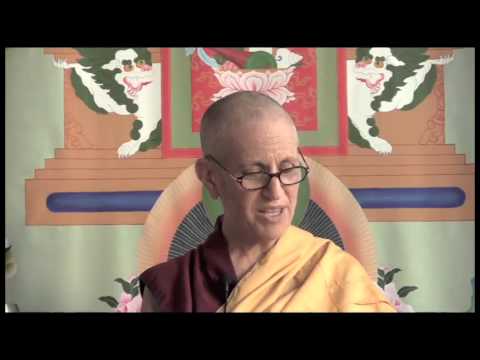Meditation outline: Attachment
Taking the ache out of attachment

What is attachment?
Attachment is a mental factor which exaggerates the good qualities of an object, person, idea, etc. or projects good qualities which aren’t there and then wishes for and clings to the object. It sees the desired thing as permanent, pleasurable, pure and existing in and of itself.
- What specific things am I attached to?
- How do I view that person or thing when I’m attached to it? How does it appear in my eyes?
- If that person or thing exists the way it appears to my attached mind, why doesn’t everyone see it that way? Why do I sometimes feel differently about it?
- What is a more realistic attitude toward that person or thing?
The disadvantages of attachment
- It breeds dissatisfaction and frustration because we continually want more and better. This prevents us from enjoying what we have.
- It causes us to go up and down emotionally according to whether we have what we’re attached to or not.
- It motivates us to connive, manipulate, and plot to get what we want. We act hypocritically with ulterior motivations, damaging our relationships with others.
- It motivates us to act unethically to get what we’re attached to, thus harming others and increasing our own sense of self-hatred and guilt.
- It causes us to waste our lives, chasing after pleasures, none of which we can take with us when we die. Meanwhile, our potential to develop inner qualities such as love, compassion, generosity, patience, and wisdom goes untapped.
The relationship between attachment and anger
When we are strongly attached to something, we become disappointed and angry if we don’t get it or are separated from it once we have it. Think of an example in your life when that has been the case. Then examine:
- Why do I get angry? What is the relationship between my expectations and my anger? What did I expect from the person, thing or situation that it didn’t have or do?
- Were my expectations realistic? Was the problem in that person or thing, or in my thinking the person or object had qualities that he, she, or it didn’t?
- What is a more realistic view of that person, thing or situation? How does this new view affect how I feel and relate to that person, etc.?
The relationship between attachment and fear
- Attachment causes us to fear not getting what we want or need. Recognize examples in your life in which you have been worried or anxious about not getting what you want. Then examine:
- Do I really need those things? What is the worst case scenario that could happen if I didn’t get them? Is that likely to happen? Even if it did, would I be completely without tools to handle the situation or are there things I could do to handle it effectively?
- What would happen if I gave up being attached to that person or thing? What would my life be like?
- Attachment causes us to fear losing what we have. Recognize examples in your life in which this is the case.
- What is the worst case scenario that could happen if I lost what I was attached to? What internal tools do I have that could help me deal with the situation if that happened?
- What would it feel like if I gave up being attached to that person or thing?
- Attachment leads to codependent relationships and to remaining in harmful situations out of fear of change.
- What am I attached to that makes me remain in that situation?
- Is that something worth being attached to? Is it in fact as wonderful as my attachment thinks it is?
- What would happen if I gave up being attached to it? What internal and external tools do I have to help me deal with the situation?
Antidotes to attachment
The attitude to cultivate is one of balance: by eliminating the exaggerations and projections we put on things, we can be more balanced in relating to them. Free of grasping and compulsiveness, we can be involved and caring in healthy ways.
The points below are for repeated reflection. An intellectual understanding of them alone does not yield the force necessary to stop destructive patterns. Thus, it is beneficial to think repeatedly about these points by making examples of them in our own lives.
Setting our priorities
Reflecting on our mortality helps us to see clearly what is important in our life.
- Imagine a circumstance in which you are dying: where you are, how you are dying, the reactions of friends and family. How do you feel about dying? What is happening in your mind?
- Ask yourself:
- Given that I will die one day, what is important in my life?
- What do I feel good about having done?
- What do I regret?
- What do I want to do and to avoid doing while I’m alive?
- What can I do to prepare for death?
- What are my priorities in life?
Attachment to material possessions
- Contemplate the disadvantages of being attached to these things.
- Think of the transient nature of what you’re attached to. Try to accept that change is the very nature of existence and that it is not realistic to expect anything external to be a lasting source of happiness. By letting go of attachment, we can enjoy something when it’s there and be relaxed when it isn’t.
- Even if I get this, will it bring me ever-lasting happiness? Will it solve all my problems? What new problems will arise from getting it?
- Consider the undesirable qualities of the object. This doesn’t lead to a negative view of the person or thing, but simply allows us to take a more global view of it, thus countering the lop-sided attachment. Feel the spaciousness that comes from seeing the object for what it is.
Attachment to the body
- Contemplate the changing nature of the body, from fetus, to infant, child, adult, old person. Will my body live forever?
- Is my body composed of pure substances? Is it inherently beautiful? After death, what will my body becomes? Is it worthy of being attached to?
- Is there some inherent essence that is my body? Am I my body?
- We must take care of our body, keeping it clean and healthy, because it is the basis of our precious human life. Through protecting this body, with wisdom and without attachment, we will be able to practice the Dharma and to benefit sentient beings.
Attachment to people
- Attachment and love are different emotions, although our feelings for a particular person may be a mixture of them.
- What is the different between loving someone and being attached to him or her?
- How does my attachment and the expectations it engenders in me interfere with my loving this person?
- Do I see the person realistically? What are his or her bad habits? What are his or her limitations?
- Try to accept the person’s good qualities as well as weaknesses, so that your attachment would decrease and you could love him or her more.
- Is it realistic to think that my relationship with this person will last forever? Will this person live forever? Must I become depressed or feel lost if the relationship changed or if the person died? How can I process the grief that results from change? How could I feel and act?
- Is there some unchangeable essence that is this person—something that always is and always will be him or her?
Attachment to ideas
We often cling to our ideas about how things should be done, to our opinions of who others are and what they should do, to our beliefs about the nature of life. We then become upset when others disagree with our ideas.
- When someone criticizes my ideas, is he or she criticizing me?
- Is something right just because I think it?
- What would happen if I did things the other person’s way? How can I let go of the fear of losing power or getting taken advantage of? Would that necessarily happen if I did things the other person’s way?
- If we see defects in the other person’s plan or idea, we can express these in a kind way, without being defensive of our own views. Imagine feeling open and undefensive, speaking firmly and clearly to another.
Attachment to praise, approval, and reputation
- How do praise, approval or reputation benefit me? Do they prevent illness or extend my lifespan? Do they really solve the problem of self-hatred and guilt? Do they purify my negative karma or make me closer to liberation or enlightenment? If not, why be attached to them?
- Praise, approval and reputation may feel nice, but if our attachment to them causes us to be angry, jealous or insecure, and thus to act negatively, then what is the sense of clinging to them?
- Think of all the new problems that they create. Others expect more of us because they no longer see us realistically, but idealistically. They are thus more likely to judge us when we make small mistakes.
- Imagine receiving all the approval, praise and reputation you ever craved for. Imagine people saying or acknowledging all the things you had ever hoped they would. Enjoy the good feeling of this. Then ask yourself, “Will this really make me everlastingly happy?
Feeling gratitude for the kindness we have received from others
To develop our sense of being interconnected with all others and being the recipient of much kindness from them, contemplate:
- the help we have received from friends: the support and encouragement we have received from them, etc. Do not think of these acts in a way that increases attachment, rather recognize them as acts of human kindness.
- the benefit we have received from parents, relatives and teachers: the care they gave us when we were young, the protection from danger, our education. The fact that can speak comes from the efforts of those who cared for us when we were young, our teachers, etc. All talents, abilities and skill we have now are due to the people we taught and trained us. Even when we didn’t want to learn and were unruly, they continued trying to help us learn.
- the help received from strangers: the buildings we use, clothes we wear, food we eat, we drive on were all made by people we do not know. Without their efforts in society, we wouldn’t be able to survive.
- the benefit received from people we do not get along with and people who have harmed us: they show us what we need to work on and point out our weaknesses so that we can improve. They give us the chance to develop patience, tolerance and compassion, qualities which are essential for progressing along the path.
Love
Love is the wish for others to have happiness and its causes. For each group of people, think of specific individuals and generate love for them. Then generalize that feeling to the entire group.
- Begin by wishing yourself to be well and happy, not in a selfish way, but because you respect and care for yourself as one of many sentient beings. Gradually spread this to friends, strangers, difficult people and all beings.
- Think, feel, imagine, “May my friends and all those who have been kind to me have happiness and its causes. May they be free of suffering, confusion and fear. May they have calm, peaceful and fulfilled hearts.”
- Generate the same feelings towards those who are strangers.
- Spread the feeling to those who have harmed you or who you do not get along with. Recognize that they do what you find objectionable because they are experiencing pain or confusion. How wonderful it would be if they were free of those.
Venerable Thubten Chodron
Venerable Chodron emphasizes the practical application of Buddha’s teachings in our daily lives and is especially skilled at explaining them in ways easily understood and practiced by Westerners. She is well known for her warm, humorous, and lucid teachings. She was ordained as a Buddhist nun in 1977 by Kyabje Ling Rinpoche in Dharamsala, India, and in 1986 she received bhikshuni (full) ordination in Taiwan. Read her full bio.


